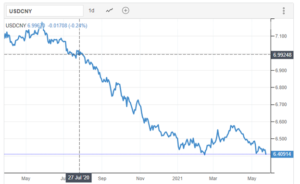I recently had lunch with Jared Van Orden and Devin Taylor, friends who are foreign exchange experts with GPS Capital Markets. I like learning from experts like Devin and Jared because they make me a better resource for my clients. When I get smarter, my clients benefit, and when my professional network grows, my clients benefit. These are also why I enjoy co-hosting our firm’s Global Law and Business Podcast, where we just released our 56th episode. The podcast is a master class for me and our audience in topics like international finance, politics, geopolitics, law, marketing, and many other areas.
When I have lunch with Devin and Jared, they always lead by asking me if I know what has happened with X or Y currency since we last had lunch, and we always discuss the Chinese yuan. In the past 12 months, the CNY has gone from a low of 7.2 to a high of 6.4 vs the USD. The yuan’s strengthening in the past year against the dollar by over 11% is good news if you’re a Chinese national or company coming to the U.S. to spend money, but it is bad news if you are a U.S. national or company going to China to spend money.
Cite: https://tradingeconomics.com/china/currency
Of course because almost no one is traveling internationally these days, this is not much of an issue in the travel industry. But it matters quite a bit to U.S. companies doing business with Chinese companies and paying in USD. Or as Jared and Devin described it to me:
We are hearing from our clients that some of their Chinese manufacturers are pushing back and asking to adjust pricing to help them deal with the continued strength of the CNY. When the yuan moved in the Chinese manufacturers’ favor they didn’t say anything, but now that it’s hitting their pocket books they are looking for help. This is really a result of neither party planning and hedging the currency risk.
This will come as no surprise to our regular readers, but your Chinese manufacturer is not your friend, even if they invited and you attended their wedding or the wedding of one of their children. There are ways to prepare for this scenario where your Chinese counterpart comes to you and says that they need to modify your contracted pricing structure to account for currency fluctuations that are hurting their bottom line.
First, you can avoid getting into this scenario by entering into a solid Chinese language contract you can point to regarding pricing. This is much harder to do when you are only dealing with term sheets or invoices.
Second, you can hold firm when your Chinese counterpart wants to renegotiate your pricing structure. This is much easier to do when you have a good contract in Chinese.
Third, you can agree to pay in yuan rather than dollars. This will work in your favor when the yuan is weakening against the dollar and will hurt you when the yuan is strengthening against the dollar. But if you have the stomach for it, you can roll the dice. You can also choose a static exchange rate as of a certain date. That introduces a similar degree of risk as agreeing to pay in yuan, but it will be a measurable, certain risk.
Fourth, you can use a foreign exchange risk strategy to help mitigate against large swings in either currency by utilizing the services of a foreign exchange brokerage. These firms offer the same services as larger national and international banks, but they often can save you a percentage point or two on your transaction.
Whatever strategy you choose to use, remember that your Chinese manufacturer or other counterpart wants to win in all scenarios at your expense, even when you may have had the forethought to foresee currency fluctuations and hedge against them in your contract.
As Jared put it, “Did anyone get a phone call during this period saying that the rates had moved in the manufacturer’s favor and the US buyer would be receiving a discount on their product payment? I highly doubt that.” For a fun but sobering recap of how Covid has impacted countries’ currencies with respect to the USD and each other, especially in the manufacturing sector, check out Jared’s recent article in Utah Business.
Developing a good currency hedging strategy is important for companies that deal in any currency beyond their home country’s currency. And coupling that with a strong contract that is enforceable in your counterpart’s home country is the way to further mitigate your transaction’s currency risk.


























